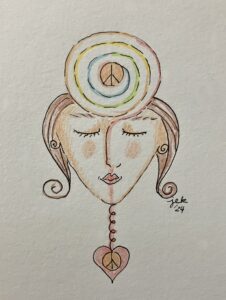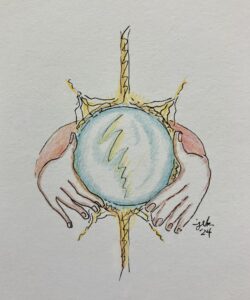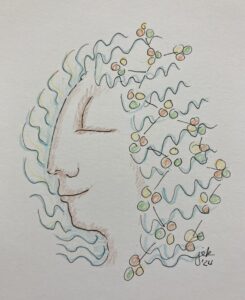
-Artwork © 2024 Jan Ketchel
Carlos Castaneda was emphatic that human beings are magical beings. His greatest lament was how the power of negative suggestion veiled our awareness of our true power of creation. The irony is that we cluelessly exercise and partake in this divine power every day to generate a limited, disgruntled sense of self.
What Carlos recognized as magical is the human power of mind to intend and physically manifest as a creator. The human species truly is the Chosen One, endowed with a divine ability to freely create.
The laws of nature rule the subconscious minds of all beings in nature. Only the human mind can override nature’s instinctual promptings and create what it wants. Whether we are aware of it or not, the suggestions we deliver, or allow to be delivered, to our subconscious minds, create the life we are in.
What distinguishes the human mind is its conscious capacity to think, and with that, its ability to choose. The human mind has this added layer of a conscious mind that has a controlling influence upon the subconscious mind, the mind that it shares with all of nature.
Animals follow fixed patterns. I knew a master hunter who stopped hunting because the fixed regularity of paths that deer travelled gave hunters a ridiculously unfair advantage. I observe how deer around our house continuously munch on the same trees and plants, despite the fact that lush vegetation is available but a few feet from their established routine.
The conscious mind is a mind that can observe, reason, and change direction. The subconscious mind is the mind of creation. These two minds are symbiotically bound to each other. The conscious mind is charged with providing responsible leadership to the subconscious mind, which fulfills, without judgment, its suggestions.
Human infants are born with subconscious instincts intact but with a blank-slate conscious mind. The conscious mind builds an identity over time, largely based upon outside influences. For instance, an infant that sleeps through the night without disturbing its parents might be hailed as a ‘good baby.’ This feedback of goodness for non-disturbing behavior may then become a major conditioning factor in the child’s personality.
The conscious personality is filled to the brim with such internalized foundational beliefs about itself that become self-fulfilling prophecies. The beliefs are suggestions to the subconscious mind, which then builds a physical, mental, and emotional definition of itself that fulfills the conscious mind’s thoughts about itself.
Understand that the subconscious is not a thinking mind; it does not judge the quality or truthfulness of the suggestions it is compelled to fulfill. The subconscious is solely a creator, who has the divine ability to transmute thought into physical being. It accepts all suggestions impressed upon it with equanimity. It is the responsibility of the conscious mind to determine what is truth and to suggest right action.
The process of freeing the conscious mind from its attachment to false and negative beliefs is fundamental to desired change. Many technologies provide tools to accomplish this. Ancient shamanic practices employ the shaman to cut the cord to internalized outside influences. Psychedelics burst through the shallow province of the conscious mind to introduce other worlds of possibility. Inner parts work utilizes active imagination and communication with inner parts to loosen the hold of their defenses and limiting beliefs.
The oldest and simplest technique is borrowed from the first one employed to shape our personalities, from birth onward: rote memorization. The phrases that were used, often laced with emotion, to tell us we were good or bad, worthy or unworthy, capable or incapable, lovable or unlovable—whether they had merit or not—shaped our concept of self.
Those same messages of childhood, true or not, have often been transmuted into our core identity, as experienced in habitual modes of thinking, feeling, and believing.
We can approach embodying a new identity in stages. If, for instance, one has no faith in the power of their subconscious to heal, they can repeatedly state, several times a day: “I have faith in the power of my subconscious to heal me.” This suggestion affords the subconscious the directive to assemble experiences that will enable one to embody the feeling of faith.
Once this suggestion is manifested, one can voice a new suggestion to direct the healing capacity of the subconscious to a specific mental or physical concern, with full confidence that the subconscious mind is being directly and successfully impressed.
Suggestions should be stated rotely and repeatedly. Bring presence and enthusiasm to each repetition but, most importantly, keep stating your intentions incessantly throughout the day and before sleep.
Take a cue from the internal dialogue that never shuts up! Let your new, positive, healing suggestions become your new inner dialogue.
Just do it!
Chuck




